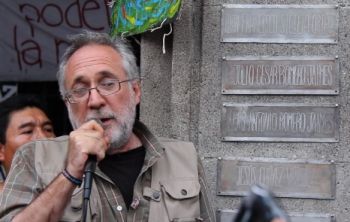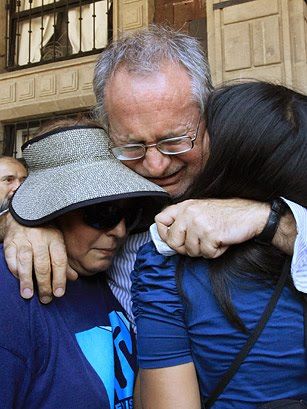
Publisher:
Bonnie King
CONTACT:
Newsroom@Salem-news.com
Advertising:
Adsales@Salem-news.com

~Truth~
~Justice~
~Peace~
TJP
Apr-16-2011 18:48

 TweetFollow @OregonNews
TweetFollow @OregonNews
Mexico: The Hour of the Poet
Salem-News.comThe new movement is spearheaded by a poet saw 40,000 people march through the streets in Cuernavaca, to protest the brutal slayings.
 Poet Javier Sicilia's 20-year old son Juan Francisco Sicilia Ortega was Murdered. Courtesy: marijuana-ganja.com |
(CUERNAVACA, Morelos Mexico) - There are times in history when unexpected events suddenly alter the social landscape and change the political rules of the game. South of the border, the 1994 Zapatista uprising in Chiapas, the assassination of presidential candidate Luis Donaldo Colosio and the hotly disputed 2006 presidential election immediately come to mind.
And there are other times in the human experience when only the words of the poets rise above confusion and chaos.
In Mexico, such moments could be unfolding now, according to some political analysts.
Galvanized by the March 28 murder of seven young people in the state of Morelos, a new movement sweeping the nation is demanding an end to criminal impunity as well as a fundamental change of course in the so-called drug war conducted by President Felipe Calderon’s administration since December 2006.
The new movement is spearheaded by a poet, Javier Sicilia, whose 20-year old son Juan Francisco Sicilia Ortega, was among the seven Morelos victims.
In an almost spontaneous wave of revulsion, as many as 40,000 people staged an April 6 march through the streets of Cuernavaca, Morelos’ state capital, to protest the brutal slayings.
 The new movement is spearheaded by a poet, Javier Sicilia, |
On the same day the people of Morelos were supported by a Mexico City demonstration of 10,000 people, while smaller, simultaneous protests ranging in size from several dozen to hundreds of people, were reported in 35 other Mexican cities.
Mexican columnist Jorge Zepeda Patterson likened the mass expressions of solidarity and outrage to other episodes of recent years, including the separate cases of businessman Alejandro Marti and Isabel Miranda de Wallace, both of whom lost children to kidnappers. Personal tragedies transformed Marti and Miranda into national symbols and spokespersons for the struggle to end impunity and corruption.
“A tragedy of injustice obliged them to function as catalysts for a society that lacks legitimate leaderships,” Patterson recently wrote.
A suspect in the Morelos crimes, Rodrigo Elizalde Mora, also known as “El Chemis,”was detained by the Mexican army in Morelos on April 14; however, the lawyer for Javier Sicilia quickly questioned “El Chemis’ reported version of how the younger Sicilia and his companions might have been murdered.
According to one press account, a bar argument with members of a drug cartel over a woman was the motive for the slayings. The federal attorney general’s office is offering a reward worth nearly one million dollars for the apprehension of other suspects allegedly linked to the Southern Pacific Cartel and wanted for the multiple murders.
Mexico City academic John M. Ackerman contends that the Sicilia affair could translate into more than just a momentary release of popular frustration, and perhaps even constitute a watershed moment during an era when many people seriously question the viability of the existing political and economic order.
In a recent essay, Ackerman compared Mexico’s current crisis with the mid 1990s, when the peso crash, banking system collapse and violent scandals led to the political defeat of the long-governing PRI party.
According to Ackerman: “Nowadays, the deep roots of crisis related to public security are the same as those of the 1994 economic crisis: authoritarianism, opacity and corruption."
In response to the political and social crisis of nearly two decades ago, many Mexicans took to the streets in a pro-democracy movement and a majority eventually voted in an opposition candidate, Vicente Fox, to the presidency for the first time.
Ironically, it remains to be seen if the dissatisfaction of Mexicans with the current governing party will contribute to a return of the PRI to the presidency in next year’s elections.
Yet in the spring of 2011, Mexico’s attention is captivated by the emotionally and historically charged words of a distraught but dignified father, Javier Sicilia.
A poet, respected intellectual, magazine columnist and Catholic believer, Sicilia has wielded an almost singular ability to enlist disparate forces with ideological roots in both conservatism and socialism into a movement which suddenly arose from the ashes of personal anguish and the fraying of societal tolerance.
Harshly critical of all the dominant institutions of Mexican society, including the Catholic hierarchy, and self-critical of the silence of the citizenry, Sicilia is calling for a national pact to put Mexico on a path of non-violence, social justice, economic opportunity and human rights.
And he is urging the organization of constituent assemblies in neighborhoods and communities with the goal of creating conditions for governance and security, reminding the powers-that-be that Article 39 of the Mexican Constitution rests genuine power with the sovereign will of the people.
Sicilia proposes that the national pact, involving all the political parties and leading representatives of Mexican society, be signed in the bloodied border city of Ciudad Juarez, a place which Sicilia described as the “most hurt city of the hurt.”
As a step in the direction of a national accord, Sicilia and friends are organizing a silent march beginning in Cuernavaca on May 5. They will trudge up the steep hill leading out of the City of Eternal Spring, descend into the Valley of Mexico and wind up in the center of Mexico City on May 8.
Sicilia was clear about the image that will flutter at the head of the national march: the Mexican flag. The poet vowed: “We will take it to where the powers of the Republic are seated; over there, where the ancient ones saw for the first time the lake, the eagle and the snake on the cactus.”
On Wednesday, April 13, Sicilia ended an eight-day protest in Cuernavaca, where he was joined by parents of the infants killed in an infamous 2009 day care center fire in Sonora; Mormon activist Julian LeBaron, brother of murdered Chihuahua anti-kidnapping activist Benjamin LeBaron: relatives of coal miners killed and never recovered in the 2006 Pasta de Conchos explosion in Coahuila; and the exiled Olga Reyes, member of the Juarez Valley family that’s suffered repeated murders.
In Cuernavaca, epicenter of the original Zapatista rebellion 100 years ago, many local movements that have been percolating across Mexico during the past few years converged on one stage and under one national banner.
Sicilia prepared a gripping speech that had the hallmarks of a new manifesto for the future of Mexico. After calling for the resignation of the governor of Morelos and other authorities, Sicilia took both the state and civil society to task for wallowing in materialism.
“Every one of you has put the economy over the supreme value of life in the most perverse sense: consumption and money,” Sicilia scolded. “In its name, you have destroyed all the environments of co-existence and with it our soil and our relations of mutual support, drowning us in the horror of money, violence and fear…”
Sicilia depicted a Mexico of two borders: one in the north, where violence and institutional rot hold sway, and another in the south, in the highlands and jungles of Chiapas, where a slice of “moral dignity (Zapatismo) continues to resist.
In between the two borders, he said, Mexico’s families are “broken but not conquered,” surviving not precisely as “terrorized” but in an “indignant” mood and still imbued with the “moral force that the Indians and excluded of this nation have known how to communicate to us.”
Sicilia prepared his final remarks with a question for the political class:
“How do you propose hold elections if you are not capable of reaching an agreement amongst yourselves to defend the lives of the sons and daughters of our beloved Mexico?”
And the poet-turned-erstwhile national conscience finished with one additional observation:
“I am also of the opinion that it is necessary to return dignity to the nation and make it so this pain serves to remake the love and justice we’ve lost.”
Sources:
- La Jornada, April 7 and 15, 2011. Articles by Rubicela Morelos Cruz and Gustavo Castillo. El Universal, April 6 and 10, 2011. Articles by Justino Miranda, Jorge Zepeda Patterson and editorial staff.
- Proceso/Apro, April 11 and 13, 2011. Articles by John M. Ackerman, Jose Gil Olmos and Javier Sicilia. Sedena.gob.mx. April 15, 2011. Press release.
- CNNenexpansion, December 22, 2008. Article by Diego Graglia.
- Pgr.gob.mx
Frontera NorteSur: on-line, U.S.-Mexico border news
Center for Latin American and Border Studies
New Mexico State University
Las Cruces, New Mexico
Articles for April 15, 2011 | Articles for April 16, 2011 | Articles for April 17, 2011

googlec507860f6901db00.html
Salem-News.com:



Terms of Service | Privacy Policy
All comments and messages are approved by people and self promotional links or unacceptable comments are denied.
Frente Civico April 19, 2011 12:29 pm (Pacific time)
500 thousand young people move to the cities every year in Mexico from from poverty stricken rutal areas. If we do not change this and stop the infinite demand for drugs from the north we won't be able to deal with this problem. Please also take into account how much damage alcohol generates - destruction of lives, families - precursor in automobile accidents. Wouldn't want to live in a world where more mind altering substances a flowing freely.
malcolm kyle April 17, 2011 7:33 am (Pacific time)
Alcohol prohibition, was a tremendous failure due to the incredible amount of crime and disorder it created. Human nature hasn't changed since the 1920s and early 30s. Then, the distribution of liquor was turned over to a whole new group of criminal entrepreneurs. Now, due to the drug war, dangerous mind altering substances are sold, unregulated, by another new criminal class. Prohibition has turned Mexico into a civil war zone, so our intentions in prohibiting these substances may well be good, but the result of our inability to recognize the futility of such an action will both deepen and prolong the agony caused by this useless and dangerous policy. The future depends on whether or not enough of us are willing to take a long look at the tragic results of prohibition. If we continue to skirt the primary issue while refusing to address the root problem, then we can expect no other result than a worsening of the current dire situation. Good intentions are no match for the immutable realities of human nature. So may we have some realism from all of you now on how to go about reclaiming both the streets and stopping this mayhem. Please start making an honest effort to address the root cause of the present horrific mess and the high proliferation of "well funded" violent Cartels --the failed regime of drug prohibition. And why not call it by it's correct name? What's happening in Mexico is clearly 'Prohibition engendered violence' By refusing to acknowledge this fact we all help to perpetuated it.
[Return to Top]©2025 Salem-News.com. All opinions expressed in this article are those of the author and do not necessarily reflect those of Salem-News.com.